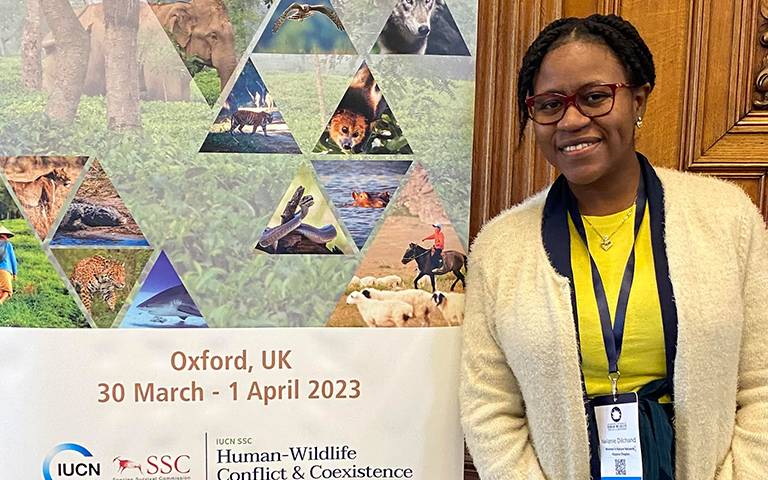Nelanie Dilchand, MSc Aquatic Conservation, Ecology and Restoration
Meet Nelanie, a graduate from our MSc Aquatic Conservation, Ecology and Restoration course.

7 March 2024
She tells us about her field classes in Norfolk and Dorset, surveying ponds and becoming the ‘Macrophyte Queen’.
Why were you interested in studying an MSc in Aquatic Conservation, Ecology and Restoration?
“The MSc in Aquatic Conservation Ecology and Restoration was of interest to me because I was deeply passionate about the conservation of aquatic systems and I sincerely believed that the knowledge, skill set, experiences, etc. to be accrued would significantly help my country.
“In Guyana, known as the land of many waters, at that time there were no aquatic ecologists or marine biologists, and given the developmental trajectory of our country, this degree, in my opinion, would have proved extremely beneficial.”
What was it that encouraged you to choose UCL to study it in?
“To be honest, I googled MSc in aquatic ecology, and I found a video about the programme and after watching, there was no doubt in my mind, this was the course for me.
“I had not heard of UCL before, however, after I conducted my research, I was extremely impressed with the academic prowess and history of UCL.”
What were the most interesting or engaging things you learned on the course?
“There were so many interesting things I learned on the course. Dr Sayer, the course Convener, is unlike any educator I had met before or since. There was always an opportunity for learning irrespective of the setting (classroom or field)”
“A concept that I learned early in the course that stuck with me is that aquatic conservation must be explored with considerations for the wider landscape; a river, wetland, pond, etc must not be seen as separate from the land.
“Longitudinal, lateral and vertical movement of water on, through or across a landscape highlight this connection.
“Further, because aquatic conservation and landscape conservation are interconnected, a multidisciplinary team and the requisite stakeholder consultation must be considered when designing conservation strategies, interventions, etc.”
Can you tell us about any particularly memorable experiences from your time as a Masters student with us?
“The field excursions were an important part of the programme and such a welcomed experience.
“My time in beautiful Norfolk and Dorset were most impactful. Norfolk was special because it was the first and last place, I conducted research in the UK.
“Surveying ponds, rivers, the saltmarshes, etc. and learning to identify the species (inverts, eels, fish, saltmarsh flora, crayfish) that inhabit those ecosystems and the conservation strategies employed provided insights that are applicable to my country.
“Dorset was special because it was there that I fell in love with macrophytes and was crowned Macrophyte Queen 2017, a title given to the student who did best on the course practical.
“A love for macrophytes and Norfolk led to me conducting research for my dissertation on the recovery of macrophyte communities in Blakeney Freshes.
“It was the perfect end to a wonderful year.”
What would you like to do in the future and how is your degree helping to get you there?
“In the future I hope to conduct research on lentic systems to better understand the ecology of those systems and survey taxonomic groups not commonly studied in Guyana, such as macrophytes and cladocera.
“I also intend to aid in the development of an index to assess water quality using macroinvertebrates as biomonitoring is still largely absent in water quality determination projects.
“The courses, fieldwork, and other opportunities I had while on the programme have prepared me for the research I wish to undertake here in Guyana.
Would you recommend studying Aquatic Conservation, Ecology and Restoration in the Department and why?
“I highly recommend studying the Aquatic Conservation, Ecology and Restoration Programme for the following reasons:
- “You are provided with a wealth of information in every module and the concomitant fieldwork gives you an opportunity to put what you’ve learnt into practice.
- “You have the opportunity to engage with and learn from experts working to conserve, monitor, etc. aquatic systems in the UK.
- “You have the privilege of learning from world-leading researchers at an academic powerhouse like UCL.
- “There are many opportunities for networking with experts you meet during field excursions or at events such as the London Freshwater Group meeting. A connection I made on the course led to me completing the “Taxonomic and field work skills in freshwater ecology and water quality" course at the Natural History Museum, London.
- “There is the possibility of learning about diverse ecosystems, within England, the UK and on other continents. Through the course I visited and had the opportunity to conduct fieldwork in Norfolk, Dorset, the Scottish Highlands and Beijing. The variability in the aquatic ecosystems, landscapes, cultures, etc. shaped my outlook as a researcher and a conservationist.
- “Lastly, being away from home can be challenging so it was wonderful to have had a family at Uni who made me feel loved and supported. Professor Sayer, Professor Axmacher, Uncle Ian (Patmore), Lily, Kes, Amanda, Azra thank you.”
More Information
IInterested in following in Nelanie’s footsteps? Find out more about our MSc Aquatic Conservation, Ecology and Restoration course and see our other degrees in the Study section.
 Close
Close

